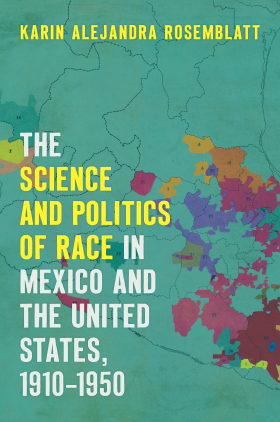The Book
The Science and Politics of Race in Mexico and the United States, 1910-1950 (Chapel Hill, NC: University of North Carolina Press, 2018).
The Author(s)
Karin Alejandra Rosemblatt

The Mexican Revolution brought sweeping political and economic change to early twentieth-century Mexico. The revolution also gave rise to intellectual and cultural currents that exercised profound influence within Mexico and the United States from 1910-1950. These intellectual and cultural movements included the highly influential work of the Mexican muralists as well as an efflorescence of writing from novelists, poets, journalists, and social scientists. Several key questions animated these thinkers, particularly questions over how to achieve political and cultural unification of the Mexican populace so that they might fulfil the expected destiny of the revolution as conceived by its proponents. Theorists debated the potential for a unified people to be forged out of the mixed mestizo and indigenous heritage of Mexico. At the heart of the debate over Mexican identity lay the question of race, specifically the relationship of inherited characteristics versus cultural traits among the Mexican people. Karin Alejandra Rosemblatt presents in The Science and Politics of Race in Mexico and the United States, 1910-1950 a rich and provocative analysis of an especially vibrant vein of the discourse over race that emerged following the Mexican Revolution. Rosemblatt presents in her newly-released book an in-depth exploration of the scholarship and policy activism among social and natural scientists, working in both Mexico and the United States from 1910-1950, who explored the concepts and dynamics of race, particularly in relationship to the politics of the era.
Key figures in the group of intellectuals and policy makers whom Rosemblatt examines include the anthropologists Franz Boas and Robert Redfield, both of whom had strong involvement with ethnographic fieldwork and studies of Mexico in the 1920s – 1930s; Manuel Gamio, a student of Franz Boas and the first Ph.D. anthropologist in Mexico; John Collier, U.S. Commissioner of Indian Affairs, and his close collaborator, anthropologist Laura Thompson. Comparative studies served as a central methodology for this transnational group of investigators in their efforts to look at the role and dynamics of race in U.S. and Mexican societies. Others had used comparative studies of the U.S. and Mexico to try to portray essential differences between the two nations, most notably Stuart Chase in his bestseller account Mexico: A Study of Two Americas (1931), in which Chase offered a heavy-handed portrayal of the Mexican people as deeply spiritual and play-loving people versus their neighbors to the north who were inescapably trapped by the demands of the machine age and progressively deprived of spiritual meaning. The thinkers Rosemblatt analyzes, however, pushed to go beyond stereotypes employed by Chase and others in their contrasts of Mexico and the United States. In this effort, they brought complexity and sophistication to discussion of such concepts as mestizo, indigenismo, and the notion of race itself. Above all, they pushed in their discussion of concepts of racial identity as well as racial and cultural dynamics, such as acculturation and assimilation, to rid these constructs of associations with evolutionary progression or social hierarchy. This transnational group of thinkers and policy makers thus strove to expand and refine the language of race and cultural identity to enable them to discuss how the governments of Mexico and the United States could define policies to promote social and economic development for indigenous populations without falling into overtly hierarchical thinking.
The Science and Politics of Race is divided into two largely chronological sections. The first part covers the years 1910-1934 and deals with the vigorous dialogue that emerged among intellectuals in the United States and Mexico in the aftermath of the Mexican Revolution and World War I. Leading questions discussed by Mexican thinkers included how to integrate the varied Mexican population into a unified society that could be governed impartially yet recognized and preserved cultural distinctions among peoples. Social scientists and policy analysts during the same time in the United States focused instead on the processes and policies associated with Americanization and questions regarding how so-called backward peoples could be assimilated into prevailing US lifeways. The second part of the book covers the years 1930-1950 and deals primarily with the formation of policies in Mexico and the United States for dealing with Native peoples. The social theorists Rosemblatt analyzes in the second segment of her book strongly reflect the politics and economics of the era. Working during the period in which the US was led by Franklin Roosevelt (1933-1945) and Mexico by Lázaro Cárdenas (1933-1940), the social theorists and government workers strove to produce policies that would aid Native peoples, assisting them especially to escape the poverty brought on by the Great Depression. Led by thinkers, such as John Collier, these public intellectuals worked to transcend the liberal assimilationist views that dominated social policy during the first three decades of the twentieth century and to stress cultural pluralism through policies that encouraged acculturation over assimilation.
In sum, Rosemblatt shows great sensitivity and insight as she teases apart the various intellectual and political threads that crosscut the discourse she explores over race, identity, and modernity. The Science and Politics of Race is a very well written and thoughtful analysis of a complex and difficult body of social theory and policy. This book will prove to be of great interest to wide number of readers, including intellectual historians, Latin Americanists, and historians of both the social and natural sciences.
About the Reviewer
Clifford Wilcox is an independent Scholar based in Ventura, CA. He studies 20th century American intellectual history, along with the history of anthropology, the history of universities, and the history of the social sciences.

0